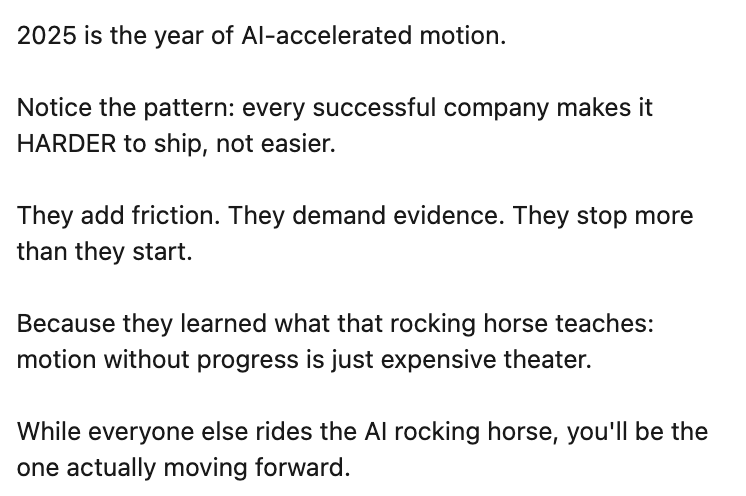Hey there! I’m Robert. Welcome to a free edition of my newsletter. Every week, I share my story of bootstrapping my startup in AI, Alignment, and Longevity. I’m documenting my journey to become my best self—and helping humanity do the same to survive and thrive in the age of AI.These newsletters include my reflections on the journey, and topics such as entrepreneurship, startups, growth, leadership, communication, product, and more. Subscribe today to become the person and leader that people love, respect, and follow.
"I've done everything right," a product manager said, shoulders slumped.
The product manager across from me had just finished rattling off twenty-five initiatives. Each one executed with care. Each one documented with precision.
"Great," I said. "Does the customer have what they want?"
"No."
The silence hung heavy. Her face shifted—confusion, then something harder to swallow.
"Then it doesn't matter what you've done. Nothing matters until the customer has what they want."
I watched her defenses rise like shields.
The justifications.
The explanations.
The desperate scramble to protect an identity built on busy work instead of breakthrough results.
That's when I knew we'd found the heart of it—the gap between feeling productive and being effective.
I used to be in this trap too—and we can all fall prey to ego.
Let’s dive in to how you learn and make real progress.
This Week's ABC…
Advice: Effort is NOT progress
Breakthrough: 3 Questions and A Kobe Story
Challenge: One brutal question to ask yourself
📖 Advice: Effort Is NOT Progress
"Success is neither magical nor mysterious. Success is the natural consequence of consistently applying basic fundamentals." — Jim Rohn
Here’s a great story from
’s LinkedIn recently (Co-Founder and CEO of Gamma—one of my favorite AI products), centered around the idea of “Do not mistake motion for progress.”Many fall into this trap.
I have too. I try hard to stay clear of it now.
I see it everywhere—leaders drowning in activity while their results stay stagnant.
Like a hamster on a wheel, spinning faster but going nowhere.
The product manager I was coaching had fallen into the most seductive trap in business: confusing effort with effectiveness.
She'd spent months presenting to stakeholders.
Countless hours in spreadsheets.
Endless meetings about… meetings.
All the hallmarks of someone who looked busy but wasn't getting the job done.
Here's what separates the average from the great:
Average leaders protect their ego by staying high-level and “strategic”.
They give themselves pats on the back for effort, not effectiveness.
Great leaders do whatever it takes, including diving into uncomfortable details.
They get obsessed.
To get the OUTCOME.
The RESULTS.
Here’s an example of a critical detail that aligns teams, that I find many people feel is below them:
Taking notes and sending them out and following up.
Super. Fucking. Boring.
But—I make sure to do this in every single meeting that I hold.
I do it consistently.
It’s boring. But, it's important. Why?
Because if you’re leading your team to row to the X on the map, you need to maximize information flow and keep the team aligned.
I see many people, including senior level directors and staff level ICs, ignore these critical details.
They consistently make excuses about how admin work takes too much from them.
I call bullshit.
I have a day job organizing transformation and change around AI native development for an org of 2000+ teammates.
And I STILL have the time to send out notes.
When I hear this from other people, it’s a yellow to red flag about their work ethic. It’s just ego and laziness in my firm opinion.
Taking notes, sending them out, following up on actions…
Those are the basics.
And the best masters of what they do, focus on the basics.
Master and do the basics consistently and you will become a better performer than 99% of your peers.
Consistency is actually the simplest yet hardest skill to master.
Showing up is actually most of the battle.
I've talked to friends who have exited at $100 million and above, to try to understand their mentality, their systems, and their behaviors.
What do they DO, that makes them stand out?
And the key trait that I see from all of them is that they just show the fuck up.
They don't complain about work that is boring.
They do it, because it gets the results.
The people that complain about boring work typically have shiny object syndrome.
I know this because I used to be this person.
I still have shiny object syndrome. I just regulate it.
Why?
Because I realized shiny object syndrome doesn't get results.
Consistency does.
Doing the “boring” things does.
🚀 Breakthrough: 3 Questions and A Kobe Story
When someone tells me they're stuck with a problem, I use a three-layer approach to cut through the noise.
"What have you actually done?"
Not what you planned.
Not what you intended.
What concrete actions have you taken?
Most people list activities—emails sent, presentations given, meetings attended.
These are inputs, not outcomes.
Then I map their inputs, towards the outcomes.
Then we see, are these inputs getting the outcomes desired?
If not, change the inputs.
Either do more of the input, do it better, or try new inputs.
More/better/new.
If you’re not getting the output, do more of it, do it better, or try new things.
That’s it. Nothing else.
That’s something I got from Alex Hormozi—simple, and so true.
"Has the outcome been achieved?"
Or, in business, startups, and product work: “Does the customer have what they want?”
This is the only question that really matters.
If the answer is no, everything else is noise.
Your effort doesn't count.
Your intentions don't matter.
Results are the only thing that matter.
So measure the result, stay obsessed with tracking it, and do more/better/new inputs until you get it.
This applies to any domain and problem space.
"Have you learned everything you need to learn?"
The answer is always no.
But I find when I coach people… they believe they’ve exhausted all options.
That’s the ego trap.
This is the difference between incremental progress towards the outcome, versus your ego getting in the way of letting you see where else learning may live.
News flash—there are so many people in the world who have achieved the result you want.
Getting more B2B 7-8 figure contracts signed?
Minimizing D7 and D28 retention in your mobile app?
Solving gnarly technical problems around database performance?
Figuring out the right B2C UX patterns to design the gamified habit loops you want your users to engage in?
Bouldering V10+?
Becoming the best urban photographer?
Whatever it is…
Unless you’re trying to invent something absolutely net new in the world like rocket ships, going to mars, the next frontier models…
You absolutely have more to learn from the world.
This particular product manager had read one book.
One.
In nearly a decade of "experience."
That's like trying to become a surgeon by watching one operation and then claiming ten years of "hands-on learning."
The Learning Trap
Here's what most people get wrong about learning: they think experience equals learning.
As if time spent matters as much as intentional time AND effort spent.
More/better/new inputs.
That’s all that matters.
That’s what this product manager told me—they are “a more experiential learner”.
Let’s break down what learning actually is.
Alex Hormozi defines learning perfectly:
Same situation, different behavior.
If you're approaching the same problems with the same methods and getting the same results, you haven't learned anything.
You've just repeated the same mistakes with slightly different packaging.
You’ve just grown older, and you may find yourself in a more senior position simply through existing longer.
But it does not mean you have cultivated deep skills and wisdom towards the domain problem space.
It does not mean you have mastered all that you need to, to achieve the result.
Real learning changes your habits.
It gives you new tools for familiar challenges.
Consistent & Intentional Reps Beget Progress
“If your job is to be the best basketball player you can be… Train as much as you can, as often as you can.”—Kobe Bryant
Here’s a story about Kobe Bryant’s work ethic.
Kobe would wake up at 3 AM every day because he wanted an edge others weren't willing to pursue.
He didn’t just want to be the best, he actioned to be the best.
Four workouts.
Every single day.
If most players trained twice a day and Kobe trained four times, over a season he accumulated double the deliberate practice.
Over a career spanning decades, this created an almost insurmountable advantage.
He wasn't just training more—he was training with intention.
Each session had specific objectives.
Each repetition was analyzed, refined, perfected.
Now, let’s zoom out.
Do you want to be…
The best product leader?
The best entrepreneur?
The best dad?
The best rock climber?
So what’s the secret?
Doing more/better/new inputs until you get the outcome.
Do it relentlessly.
What Did I Do This Week?
Besides making great progress on the startup and day job work, I hit a personal record in my climbing.
I’ve been working on this 6-move boulder project for 2+ years. Probably spent 30+ sessions on it, figuring out the intricate hip movements, how to leverage momentum the right way, and more.
6 moves. 30+ sessions. 2 years.
Figuring out the details.
And I got the outcome.
More/better/new.
Here’s some of the progression.
Example of one of the first projecting sessions:
Maybe 5+ sessions in, still damn hard (I was trying both sides for symmetry):
Trying to figure out the top, the hardest part. What climbers call “the crux”:
Putting in reps into the second crux, or the second hardest move:
The send go after countless hours spread across 2+ years:
At first it felt impossible.
But I chipped away at it until it became not only possible, it felt easy. I showed up consistently and relentlessly, and the result became inevitable.
That is what mastery, true learning, and growth demands.
On to the next challenge.
💥 Challenge: Think About It
Do you want to be the best version of yourself, in any domain or identity that matters to you?
Ask yourself these 3 things:
"What have you actually done?"
"Has the outcome been achieved?"
"Have you learned everything you need to learn?"
Then— get obsessed over the outcome, not your effort.
Get after it.
You got this.
Your future self will thank you.
Liked this article?
💚 Click the like button.
Feedback or addition?
💬 Add a comment.
Know someone that would find this helpful?
🔁 Share this post.
P.S. If you haven’t already checked out my other newsletter, ABCs for Building The Future, where I reflect on my founder’s journey building a venture in the open. Check out my learnings on product, leadership, entrepreneurship, and more—in real time!
P.S.S. Want reminders on entrepreneurship, growth, leadership, empathy, and product?
Follow me on..





